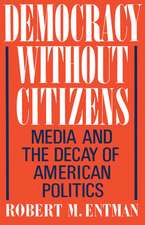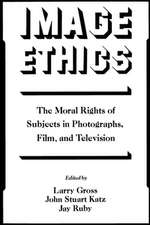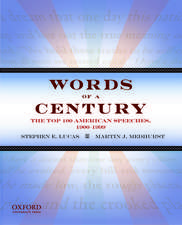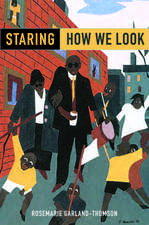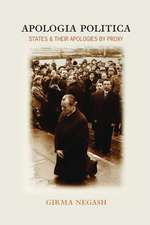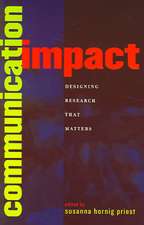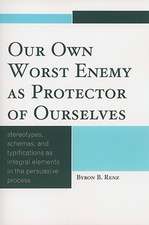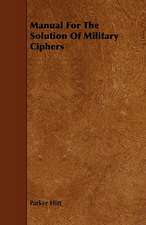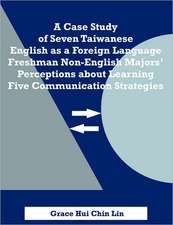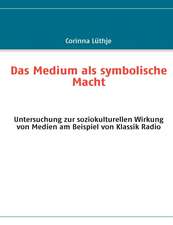Where Ideas Go to Die: The Fate of Intellect in American Journalism
Autor Michael McDevitten Limba Engleză Paperback – 29 iun 2020
Preț: 182.75 lei
Preț vechi: 196.16 lei
-7% Nou
Puncte Express: 274
Preț estimativ în valută:
34.97€ • 37.98$ • 29.38£
34.97€ • 37.98$ • 29.38£
Carte disponibilă
Livrare economică 21-27 martie
Preluare comenzi: 021 569.72.76
Specificații
ISBN-13: 9780190869946
ISBN-10: 0190869941
Pagini: 272
Dimensiuni: 231 x 155 x 20 mm
Greutate: 0.39 kg
Editura: Oxford University Press
Colecția OUP USA
Locul publicării:New York, United States
ISBN-10: 0190869941
Pagini: 272
Dimensiuni: 231 x 155 x 20 mm
Greutate: 0.39 kg
Editura: Oxford University Press
Colecția OUP USA
Locul publicării:New York, United States
Recenzii
One of the book's chief strengths is the way its substantive chapters take a multimodal approach to interrogating how anti-intellectualism manifests in journalistic text, practice, and education. ... One leaves this book with a deeper understanding of how an obligation to preserving enduring normative standards can leave practitioners, educators, and advocates alike blind to all the ways journalism's institutional arrangements are built on a compromise with more unsavory realities.
In this provocative and timely book, McDevitt guides us through the many ways that journalism is not a neutral conduit but an active shaper of what ideas make it into the public arena. There are no conspiracy theories here. Instead, we see how journalistic ideologies and practices converge to constrain what can be thought at any time.
McDevitt offers an insightful and provocative study of the anti-intellectualism that characterizes so much of mainstream journalism in the United States. Not an indictment of journalists but a critique of journalism, McDevitt focuses on taken-for granted newsroom norms and the consequences of their ideological underpinnings. This book adds a new and important chapter to the history of the culture of modern American journalism.
This book is an eye-opener. If you've thought of journalism as being a knowledge profession, this book will lead you to think again. McDevitt systematically unveils the anti-intellect strain that cuts through American journalism and journalism education. Readable and illuminating, the book is a must read for everyone in the journalism field, and for those who care about the quality of the information on which our democracy depends.
McDevitt provides a fresh and timely perspective on journalism's current predicament, arguing that the press must free itself from the forces of anti-intellectualism if it is to resist the post-truth illiberal assault. The populist wave attacks elite-based expertise, but being historically dubious of expertise has left journalism ill-equipped to push back. Without its own intellectual autonomy, the press risks both catering to a public running on emotion or passively accommodating the currupting power of special interests.
a welcome critique of the behind-the-scenes of journalistic practice, rhetoric, and control
In this provocative and timely book, McDevitt guides us through the many ways that journalism is not a neutral conduit but an active shaper of what ideas make it into the public arena. There are no conspiracy theories here. Instead, we see how journalistic ideologies and practices converge to constrain what can be thought at any time.
McDevitt offers an insightful and provocative study of the anti-intellectualism that characterizes so much of mainstream journalism in the United States. Not an indictment of journalists but a critique of journalism, McDevitt focuses on taken-for granted newsroom norms and the consequences of their ideological underpinnings. This book adds a new and important chapter to the history of the culture of modern American journalism.
This book is an eye-opener. If you've thought of journalism as being a knowledge profession, this book will lead you to think again. McDevitt systematically unveils the anti-intellect strain that cuts through American journalism and journalism education. Readable and illuminating, the book is a must read for everyone in the journalism field, and for those who care about the quality of the information on which our democracy depends.
McDevitt provides a fresh and timely perspective on journalism's current predicament, arguing that the press must free itself from the forces of anti-intellectualism if it is to resist the post-truth illiberal assault. The populist wave attacks elite-based expertise, but being historically dubious of expertise has left journalism ill-equipped to push back. Without its own intellectual autonomy, the press risks both catering to a public running on emotion or passively accommodating the currupting power of special interests.
a welcome critique of the behind-the-scenes of journalistic practice, rhetoric, and control
Notă biografică
Michael McDevitt is Professor of Journalism and Media Studies in the College of Media, Communication and Information at the University of Colorado. He previously worked as a reporter and editorial writer for newspapers in the San Francisco Bay Area.


